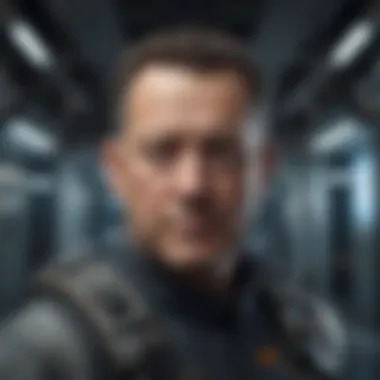An In-Depth Analysis of Tom Hanks' Movie: Finch


Overview of the Entertainment, TV Show, or Film discussed
Background Information
"Finch" is a notable addition to Tom Hanks' illustrious career, released in 2021 on Apple TV+. Directed by Miguel Sapochnik, the film offers a unique twist on survival narratives within the science fiction genre. Hanks portrays the character Finch, a robotics engineer who embarks on a journey to protect his robotic dog. The film engages audiences with its exploration of companionship amid an apocalyptic world.
Brief Synopsis
The storyline follows Finch, one of the last survivors in a post-apocalyptic landscape. He creates a robot named Jeff to ensure the survival of his canine companion, Goodyear, after Finch's own time is running short. As Finch, Jeff, and Goodyear venture beyond their shelter, they confront the uncertainties and challenges of their hostile environment. The narrative unfolds through their interactions and the development of their relationships, leading to profound moments of connection.
Key Details about the Creators
Miguel Sapochnik, known for his work on "Game of Thrones," directs the film with a strong visual aesthetic and deep emotional resonance. The screenplay is co-written by Craig Luck and Ivor Powell. Supporting cast members include Caleb Landry Jones as the voice of Jeff and the dog, Goodyear, played by a trained canine actor. Hanks' performance remains the film's cornerstone, carrying the emotional weight through his nuanced portrayal.
Analysis and Critique
Evaluation of Performance
Tom Hanks delivers a remarkable performance as Finch. He embodies both the fragility and resilience of his character, providing layers of depth. Hanks deftly navigates the emotional landscape, evoking empathy from the audience. The interactions with Jeff, voiced by Caleb Landry Jones, enhance the film's emotional core. The director’s choice to create a robot with depth and personality allows for Hanks’ character to explore themes of love and loss.
Comparison to Similar Works
"Finch" draws parallels with films such as "Cast Away" and "I Am Legend," where isolation plays a crucial role, yet it distinguishes itself through its robotics angle. Unlike the solitudes of previous works, Jeff adds a unique layer of companionship. The dynamic enriches the viewer's understanding of relationships not only in human terms but also through artificial intelligence.
Identification of Themes
The film weaves various themes, including survival, companionship, and redemption. The tension between hope and despair is palpable as Finch grapples with his own mortality while nurturing connections with Jeff and Goodyear. The stylistic choices, including cinematography and sound design, contribute significantly to the film's ability to immerse viewers in its world.
Episode/Scene Breakdown
Detailed Breakdown of Notable Scenes
One pivotal moment occurs when Finch teaches Jeff about emotions and friendship, which symbolizes the film's larger commentary on bonds—even those formed with artificial beings. The scenes of struggle against the elements create urgency and reflect the predicament of humanity amid calamity.
Key Moments and Character Arcs
As Finch faces obstacles, his character arc progresses from a conflicted survivalist to a more selfless figure willing to risk everything for his companions. Jeff evolves as an entity capable of understanding Finch's emotions, leading to impactful scenes where audience perceptions of robotics are challenged.
Audience Reception and Ratings
Critical and Audience Responses
The film received mixed reviews, with some critics praising the emotional depth and performances. Others felt the pacing was slow compared to similar films. Audience reception reflects a tendency toward appreciating the themes of companionship and hope amid despair.
Mention of Viewer Ratings
On Rotten Tomatoes, "Finch" holds a moderate score, indicating divided opinions. It has sparked conversations on platforms like Reddit, where viewers express their thoughts on its human-robot dynamics. Comparing perspectives reveals a consensus on Tom Hanks’ exceptional performance, regardless of the varied literary critiques.
Recommendations and End
Personal Recommendations
"Finch" is recommended for fans of science fiction and character-driven narratives. It appeals particularly to viewers interested in the psychological aspects of survival and companionship. Casual viewers may find the slower pacing challenging; however, those willing to engage deeply with its themes will be rewarded.
Summarization of Key Points
This analysis highlights the film's exploration of connection in desolation, Tom Hanks' impressive performance, and the innovative use of robotics to evoke emotion. Finch's journey, filled with life lessons, emphasizes the importance of relationships.
Final Thoughts
In an era that demands reconnection in various forms, "Finch" stands as a significant work. Its treatment of relatable themes allows it to resonate not just as entertainment but as a profound reflection on modern existence.
Overview of Finch
The movie Finch stands out as a significant addition to Tom Hanks' illustrious career. It brings together a compelling narrative that delves into themes of survival, companionship, and the intersection of humanity with technology. Understanding the essence of this film is crucial for a deeper appreciation of Hanks' performance and the story itself.
Importance of Overview
An overview of Finch allows readers to grasp the broader context before diving into the specifics. It provides insight into the premise and the character dynamics that drive the plots. This foundation will help the audience engage more fully with the detailed analysis that follows in subsequent sections.
Considerations


- Character Development: The evolution of the main character, Finch, showcases Hanks' ability to portray depth and complexity.
- Themes: The exploration of humanity's resilience in a technologically dominated world offers pertinent reflections relevant to contemporary society.
- Cinematic Merits: From direction to cinematography, understanding these elements enriches the overall viewing experience.
In the next section, we will delve into the introduction to the plot, summarizing the experiences and challenges Finch faces amidst a post-apocalyptic backdrop.
Character Analysis
Understanding character dynamics is essential in any narrative. In Finch, the portrayal of characters is not just about acting but serves to reflect deeper themes within the film. This section will explore how Tom Hanks embodies the role of Finch and analyze the supporting characters that enhance the storyline.
Tom Hanks' Role as Finch
Tom Hanks plays the central role of Finch, a man navigating a desolate world after a catastrophic event. The depth he brings to Finch is remarkable. This character isn’t merely a survivor but a complex individual grappling with his past. This adds layers to the narrative.
Hanks illustrates Finch's vulnerability and strength with remarkable nuance. He is a character defined by love and loss, continually seeking to protect his robotic companion, Jeff, and ensure the survival of his unique vision of humanity. Hanks uses subtleties in expression and tone to convey Finch's emotional landscape. This complexity makes him relatable, allowing the audience to connect with his plight.
Hanks' performance is especially noteworthy when Finch faces moral dilemmas. The audience sees his internal struggles reflected in Hanks' eyes. As he interacts with Jeff, moments of humor emerge subtly, providing relief from the overarching somber atmosphere. Hanks balances these feelings skillfully, ensuring the character remains credible while navigating a harsh world.
Supporting Characters
The movie enriches its narrative through a selection of well-crafted supporting characters. Each plays a pivotal role in shaping Finch’s journey, contributing to the film's thematic resonance.
One significant character is Jeff, the AI robot Finch creates to serve as a companion. Jeff embodies innocence and curiosity, contrasting Finch's hardened demeanor. Their relationship is central to the film; it reflects the broad themes of companionship and hope amid despair. Jeff’s development allows for moments of growth for Finch, making their dynamic pivotal to the overall narrative.
Another supporting character is the voice of the dog, which symbolizes loyalty and unconditional love. This character further emphasizes what Finch stands to protect. Through these relationships, the film highlights the fundamental human connections that endure even in the most challenging circumstances.
Overall, the characters in Finch are not merely tools for storytelling. They embody the film’s exploration of love, loss, and the longing for connection in a world devoid of certainty. Their interactions drive the narrative, providing depth that resonates with audiences.
This analysis highlights how character development in Finch is essential to its storytelling, creating a multifaceted experience that goes beyond the surface.
The Science Fiction Context
The science fiction genre plays a crucial role in the narrative framework of Finch. It is not merely a backdrop; it provides rich thematic elements that resonate with viewers on multiple levels. In this film, the stark realities of a post-apocalyptic world intertwine with technological advancements, offering a thought-provoking exploration of humanity's relationship with technology. As a genre, science fiction engages with profound questions about existence, survival, and ethical implications of advances in AI and robotics. It opens a dialogue about the future we are crafting through our choices today.
Exploration of Post-Apocalyptic Themes
The narrative of Finch is deeply rooted in post-apocalyptic themes. This setting invites audiences to reflect on humanity at its most vulnerable. The desolation depicted in the film is a result of catastrophic events, leading to a society on the brink of extinction. Watching Finch, portrayed by Tom Hanks, navigate this bleak landscape evokes questions about resilience, loneliness, and the essence of human spirit. The isolation experienced by Finch serves not merely as a plot device but as a lens through which the audience can examine their own relationships and values in an increasingly disconnected world.
The film illustrates the inherent struggle for survival while emphasizing the importance of hope and ingenuity. Finch’s journey is a testament to his determination to protect his creation and himself, illustrating that even in despair, the human spirit can strive toward meaningful connections.
Technological Elements
The use of technology in Finch is pivotal. The film features a robotic companion named Goodyear, who embodies the possibilities and risks of artificial intelligence. This character is not just a sidekick; it challenges the notion of what it means to be sentient. Through interactions between Finch and Goodyear, the film opens a dialogue regarding the ethical lines we might cross in the pursuit of technological advancements.
Furthermore, the portrayal of technology serves as a double-edged sword. On one hand, it represents hope and the potential for creating new forms of life. On the other hand, it raises alarming questions about dependency on technology in crises.
Directorial Approach


The directorial approach in Finch serves as a fundamental pillar of the film's overall impact. Under the guidance of director Miguel Sapochnik, this movie unveils a distinctive narrative style that engages the audience on multiple levels. Sapochnik's meticulous attention to detail is evident in how he constructs scenes that enhance the emotional weight of the story. The effectiveness of his vision in weaving together themes of survival, humanity, and technology showcases the role of the director in translating a script into a compelling visual narrative.
The specific elements of Sapochnik’s directorial style contribute significantly to the film's essence. The use of pacing is especially striking. Scenes flow seamlessly into one another, reflecting a world that is both desolate and profound. This rhythmic quality allows the audience to immerse themselves in the protagonist's journey. Furthermore, the choices made in framing shots reveal the isolation of the characters, often emphasizing their solitude in a vast, empty landscape.
Directorial decisions affect viewer engagement significantly. For instance, the way Sapochnik captures Tom Hanks' character, Finch, often involves close-ups that allow for intimate exploration of his emotional state. This technique draws viewers into Finch's internal struggles while simultaneously making them reflect on broader existential themes.
Overall, the director's approach is critical in shaping the audience's experience. It transforms Finch from a simple story into a profound exploration of what it means to be human in a world dominated by technology.
The Director's Vision
Miguel Sapochnik's vision for Finch centers on the juxtaposition of human emotion against a backdrop of a post-apocalyptic landscape. His commitment to exploring the nuances of isolation and connection is a hallmark of his storytelling style. Sapochnik aims to present a universe where technology intersects with humanity in unexpected ways. This vision is evident in how the narrative unfolds, effectively blending dramatic elements with moments of introspection.
Through careful direction, Sapochnik crafts a narrative that resonates with contemporary audiences. He encourages viewers to confront uncomfortable truths about their relationship with technology and companionship. The director's focus on nuanced character development ensures that Finch’s relationships—whether with his robot or memories of past humanity—remain central to the film's emotional core.
Cinematography Techniques
Cinematography plays a pivotal role in Finch, enhancing the storytelling with visual depth. Sapochnik collaborates with cinematographer Mauro Fiore to create a visually arresting portrayal of the desolation and beauty of the film's setting. They employ various techniques, including:
- Wide Shots: These are used to emphasize the barren landscapes, illustrating the starkness of the environment where Finch navigates.
- Close-Ups: Close-up shots capture the intricate emotions of Finch, allowing the audience to connect deeply with his character's journey.
- Natural Lighting: The use of natural light reinforces realism, pulling viewers further into the narrative's authenticity.
- Color Grading: A muted color palette conveys the somber tone of the film, aligning perfectly with its themes of loss and hope.
Overall, the cinematography in Finch is more than just a visual accompaniment; it serves as a narrative device that deepens the audience’s emotional engagement. The choices made in visual storytelling align seamlessly with Sapochnik’s directorial vision, culminating in a film that resonates profoundly with its viewers.
Soundtrack and Score
The soundtrack and score of 'Finch' play a vital role in enhancing the film's emotional depth and narrative structure. Music is not just an accompaniment; it serves as a crucial storytelling tool that shapes viewer perception and experience. In this film, the score is crafted to resonate with the themes of isolation, hope, and humanity, which are prevalent throughout the story. Composed by Gustavo Santaolalla, the musical elements are minimalist but impactful, setting the tone for each critical moment in the film.
Musical Composition
Gustavo Santaolalla employs a variety of instruments in 'Finch.' The soundtrack features soft guitar strumming, subtle piano notes, and electronic sounds that reflect a blend of human emotion and technological elements. Each piece is deliberately placed, enhancing scenes that evoke feelings of longing and reflection. The use of silence is also prominent, allowing viewers to absorb the weight of certain moments without distraction.
- Key Elements of the Composition:
- Soft guitar melodies that echo Finch's solitary journey.
- Ambient sounds that emphasize the film’s post-apocalyptic setting.
- Sparse instrumentation that highlights emotional beats, contrasting with the protagonist’s circumstances.
This careful attention to musical detail contributes to the overall mood of the film, allowing the audience to connect with Finch's struggles and aspirations on a deeper level.
Impact on Narrative
The score not only complements the visual storytelling but also drives the narrative forward. Music in 'Finch' acts as an emotional guide, helping audiences navigate complex themes.
"The music became the emotional backbone of the film, reinforcing the connection between the characters and their environment."
Moments of tension are amplified by crescendos in the score, while quieter scenes benefit from soft, reflective tones. This interplay encourages viewers to engage with the characters' internal conflicts. For example, during Finch's moments of vulnerability, the music provides a poignant backdrop that invites empathy.
- Effects of the Score on Narrative:


- Establishes mood and tone throughout the film.
- Enhances emotional responses to key scenes.
- Connects thematic elements to character development.
Critical Reception
The critical reception of a film plays a significant role in shaping its legacy and how it is perceived by the public. In the case of Finch, the response from both critics and audiences provides insight into the film's impact and effectiveness in communicating its themes. First, reception acts as a mirror reflecting what works in the narrative and production. Secondly, it informs potential viewers about the expected quality and depth of the film. Thus, critical reception serves as an essential component of film analysis, providing crucial context to understand the overall cinematic experience.
Reviews from Film Critics
Film critics have a varied viewpoint when discussing Finch. Many highlight Tom Hanks' exceptional performance and mention the emotional weight he brings to the character of Finch. For instance, reviews from platforms like Rotten Tomatoes mention, "Hanks imbues the role with a quiet determination and deep emotional resonance." Moreover, critics have pointed to the film’s ability to balance human emotion with a narrative steeped in science fiction. The cinematography and direction received praise too, with some noting, "The landscapes are haunting yet beautiful, adding another layer to the storytelling."
While many critics appreciate the film's emotional narrative, some express concerns regarding pacing. A few reviews suggest that the film takes time to establish its world, which could potentially lead to viewer disengagement. Nonetheless, the consensus among critics seems to underscore the film as a worthy addition to the science fiction genre, especially considering its exploration of themes related to humanity, companionship, and survival in a world fragmented by catastrophe.
Audience Reactions
Audience reactions to Finch have largely mirrored critical responses, though with some variations. Many viewers resonate deeply with the emotional core of the story. Comments on social media platforms like Reddit reflect sentiments such as, "This film touched my heart in ways I didn't expect," indicating that audiences are profoundly affected by Hanks' portrayal and the film's exploration of loss and hope.
While many express appreciation for the film's visual style and its thematic depth, some find it lacks the exhilarating tempo typical of mainstream science fiction movies. Occasionally, discussions center around Finch being slow-paced, which may deter some viewers seeking more action-oriented narratives. Nonetheless, this has not overshadowed the film’s overall positive reception, as many articulate the importance of slower storytelling as a method of fostering emotional connection.
In summary, the critical reception of Finch provides a comprehensive overview of how the film is received both by critics and the audience. It frames the narrative as a complex exploration of human emotion within the science fiction context, while also highlighting the varying perspectives that contribute to the film's discourse.
Cultural Implications
The cultural implications of Finch resonate on several levels. This film, featuring an iconic actor like Tom Hanks, serves as a reflection on the current societal issues and human resilience. In a world increasingly shaped by technology, Finch raises questions about our relationship with artificial intelligence and what it means to be human. This exploration provides audiences with an opportunity to consider how technology impacts our lives and identities.
Reflections on Humanity
Finch delivers profound insights into the human experience, especially in a post-apocalyptic setting. The film examines themes of survival, companionship, and the nature of love against the backdrop of a desolate landscape. As Finch, Tom Hanks portrays an individual deeply affected by loss and isolation, which allows viewers to witness the rawness of human emotion. This journey makes audiences think about the significance of connections we hold dear.
The narrative also underscores the need for hope, even amidst destruction. It is through his relationship with a robot, which he builds almost like a child, that Finch manifests his humanity. This dynamic prompts a reflection on whether emotional bonds can exist with artificial beings and what that means for our understanding of relationships.
Impact on Contemporary Cinema
The film also has relevant implications for contemporary cinema. In an industry that frequently blends human stories with advanced technology, Finch stands out for its more intimate focus on character rather than spectacle. It encourages filmmakers to prioritize the emotional core of their narratives. This perspective is especially vital in an era where viewers are bombarded with high-budget blockbusters that often overshadow character development.
Cinematically, Finch also explores new frontiers in storytelling. By engaging with themes of artificial intelligence and the fragility of human life, it poses a challenge to traditional narrative forms. It urges audiences to consider how narratives can evolve with advancements in technology. As we witness characters grappling with their fates in a tech-driven world, the film underscores the notion that storytelling can adapt to reflect modern dilemmas.
In summary, Finch not only entertains but also inspires critical thought about humanity and cinema. The reflections on personal relationships and the impact of technology serve as a thought-provoking experience for audiences, enriching the conversation around both cultural implications and artistic expression.
Epilogue
The conclusion serves as a critical component in this article, wrapping together the various elements discussed about the film Finch. This part provides an essential summation that highlights key insights and reflections on the film's content and its broader implications within the cinematic landscape. Specifying the importance of the message helps to reinforce the relevance of the themes, character growth, and the stylistic choices made by the filmmakers.
Final Thoughts on Finch
Finch is more than just a science fiction film; it represents a thoughtful examination of human connection amid desolation. Tom Hanks' portrayal of Finch elicits a profound empathy that resonates with audiences. The film asks pressing questions about existence, resilience, and the future of technology in society. The slow pacing allows viewers to absorb and reflect on the depth of the narrative.
Future Implications of the Film
As Finch continues to be studied and discussed, its implications for future cinema cannot be underestimated. The film signifies a shift toward introspective storytelling within the science fiction genre. Its success may inspire filmmakers to focus more on narrative depth rather than solely relying on visual effects and blockbuster elements.
Moreover, it can shape how technology is portrayed in future films. The relationship between humans and their creations, particularly artificial intelligence, is crucial in modern narratives. Future productions might take cues from Finch, striving for more humanistic portrayals of technology and its impact on society.
The reception of Finch suggests a growing audience desire for films that challenge their perceptions and provoke thoughtful discourse, pushing the cinematic industry to explore uncharted territories that blend entertainment with intellectual engagement.







